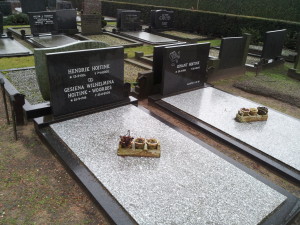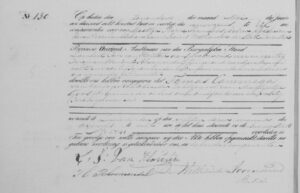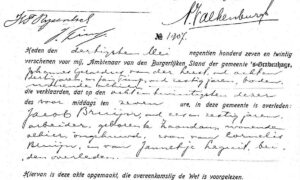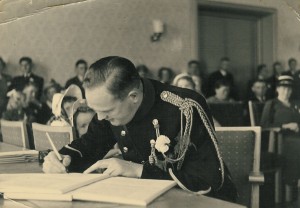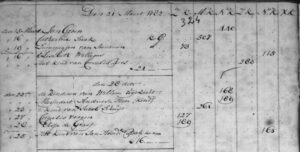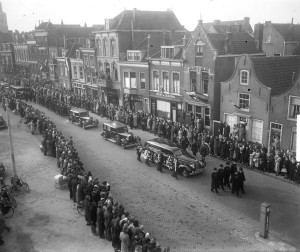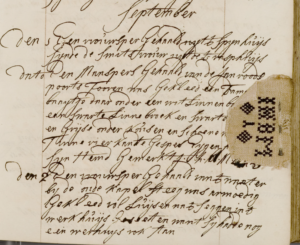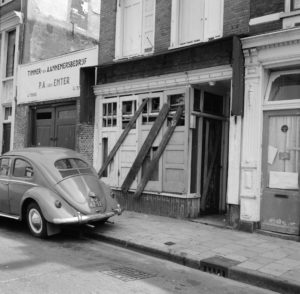In the Netherlands, vital records do not immediately become public but remain closed for a certain period: Birth records: 100 years Marriage records: 75 years Death records: 50 years. The records become public on 1 January of the year following the embargo period. As I described in a previous post, it may be possible to obtain copies of non-pubic records with permission of the person involved or with proof of their death. In this post, I will describe some alternative sources for … [Read more...]
Quick tip – Follow up on unusual death places
If your ancestors died in a place where they did not live, there could be a story there. Perhaps they were committed to a mental hospital, like Thomas Cammenga or Gerrit Jan van Nijkerken. Perhaps they met with an accident, like Adriaan Marijnissen. Perhaps they were in jail, or visiting relatives. You can check the links articles for examples of how you can approach such research. … [Read more...]
Unusual death place case study: Thomas Cammenga
When Thomas Cammenga died on 5 May 1842, he did not die in his place of residence, Leeuwarden in Friesland, but in Deventer, Overijssel. His death record showed he died at the Bagijnenstraat.1 Deventer was 120 km/75 miles from Leeuwarden. Whenever we notice something odd like this, we have to ask ourselves why: Why did Thomas die in Deventer even though he lived in Leeuwarden? Let's go through some of the common reasons why somebody died away from home: Jail. Leeuwarden had its … [Read more...]
Ask Yvette – How to find a Dutch will
One of our Twitter followers, Karen de Bruyne, asked on Twitter how to find the will of her great-grandfather-in-law Jacob Bruijn, who died in The Hague on 28 May 1927. Since there are several ways to go about it, I thought I would write a blog post about it. Most people in the Netherlands did not have wills, either because there was not much to inherit, or because they were happy with the default way their estate would be inherited. Since 1811, wills were recorded by notaries. Before … [Read more...]
Level 2 Checklist – Vital Statistics
Last month I issued my Level-Up Challenge, challenging you to assess how complete your research is. Level 2 is vital statistics only. In this blog post, I will explain which sources I feel I need to have found or searched for in order to say I have reached level 2. For each vital event, I want to have found at least one of the sources indicated here so I know where and when a person was born, married, and died. Date and place of birth Birth record (civil registration) I want to find … [Read more...]
Quick tip – Use Different Types of Death Records
In the period after 1811, the civil registration death records are the most reliable and informative records to use. In the period before 1811, there are different types of records that can act as substitutes for death records: Burial records kept by the churches Account books by the churches or deacons where fees are recorded for renting a pall, ringing the bells, or paying for the grave. Records of the death duties levied by civil authorities. Not all records exists in every … [Read more...]
Dutch term – Doodsoorzaak
The doodsoorzaak is the cause of death. Dutch civil registration death records don't record the cause of death. See How to find the cause of death for some other possibilities. … [Read more...]
Dutch term – Haaldode
A haaldode is a dead person that was retrieved. I have only ever seen the word used in Amsterdam records, but it may have been used elsewhere as well. In Amsterdam, a lot of people were living in poverty by the end of the 1700s. People died in the streets or drowned in the canals. Their bodies were retrieved and brought for inspection to a hospital at the Overtoom. They were recorded in a special register of haaldoden. If their identity was unknown, the record would include a description of … [Read more...]
Quick tip – The parents in the death record may be wrong
Civil registration records are generally reliable. They are created on the day itself or a few days afterward. But not all information in the record is of the same quality. In my experience, the information about the parents in a death record is the least reliable of all the information you can find in civil registration records. The informant is usually a neighbor, not a family member, who probably never knew the parents of the deceased. They may have misheard, or misremembered. They may … [Read more...]
Quick tip – Why Did He Die Elsewhere?
Sometimes, you will find a death record that shows your ancestor died in a different place from where he was living all his life. Common reasons are: He was in a hospital receiving care. He was institutionalized in a mental hospital. This sometimes happened to elderly people who suffered from dementia. He was in jail. He was there on business. He may have been living with relatives. He may have been visiting relatives. If you read the death record, it should say whether … [Read more...]
